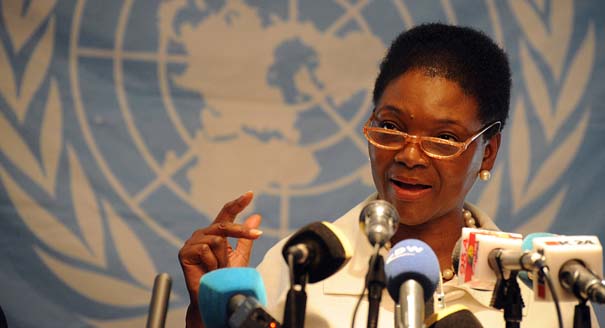Valerie Amos, UN Under-secretary General and Emergency Relief Coordinator, was at Carnegie Europe last Friday to speak about Syria. She later talked to Judy Dempsey about the tragedy unfolding in the country.
Amos has been to Syria four times over the past twelve months. Each visit is worse than the previous one.
There are more people killed—now nearly 70,000. There are more internally displaced civilians—now 1.5 million. There are more refugees crossing into neighboring Jordan, Lebanon, and Turkey—now 750,000. There are more accounts of rape and sexual abuse of women. There is more destruction. And still, there is no political solution in sight.
Amos’ first task is to provide food and shelter to those in need. That means talking to both sides of the conflict. UN agencies have often been criticized for talking too much to the government and not enough to the opposition. Amos said this was changing.
“One of the criticisms of our response has been that we were working too much with the government,” Amos explained.
“The point I make all the time is that we have to talk to everybody. We still have a government that controls part of the country. But we have a responsibility to talk to the opposition, too. I think that we were slower to do that. We have made contact with the humanitarian arm of the Syrian National Coalition. We are looking at ways in which we can strengthen our operations outside of Damascus through the establishment of what we call humanitarian hubs. We have established one already in Homs. Our goal is to engage with groups on the ground so that we can deliver aid to areas where it is difficult to cross the line from a government-controlled to an opposition-held area.”
Everywhere Amos has traveled, she has seen an extraordinary degree of destruction. Last year she visited Homs, the scene of some terrible fighting and violence.
“The impact of seeing an entire neighborhood of a city destroyed where not a single building remained untouched was absolutely shocking. Those images will stay with me,” Amos said. “My huge, huge concern is that this is now being replicated in many towns and cities across Syria.”
The situation on the ground is, according to Amos, appalling, especially for women and children. There are widespread reports of rape, sexual abuse, and unremitting violence. Children are traumatized.
“I don’t think we talk about it enough,” Amos said. “This is a crisis with a huge human impact. We need to find ways of alerting people to the human impact, of alerting people to the brutality. I think sometimes it is very difficult and painful to hear, but we have to know and understand that this is what is going on.”
Some of the organizations that are working with refugees have told Amos that government soldiers were apparently instructed to rape women.
“From what the refugees say when they begin to talk, it appears indeed that some soldiers have been instructed to use sexual abuse. It is a way to cow a community into submission, to make people fearful,” Amos said.
“I sometimes feel that these human tragedies are not receiving enough attention. When different groups get into conflict, winning is the thing that they focus on. The human impact gets lost. And that’s why we have to keep ensuring that the government and the opposition recognize that their behavior has a human impact.”
That also means trying to persuade both sides to allow food through to the ever-growing numbers of internally displaced people.
“The World Food Program has been trying to reach up to 1.5 million people through its partners on the ground,” Amos said. “It is consistently reaching about 1.2 million. There have been months where we have hit the 1.5 million mark. That has not been consistent. Because of a lack of resources—meaning money—rations have had to be cut. It [the WFP] is now looking at ways at which it can add another one million. That is extremely costly.”
“We have delivered blankets and mattresses to about 550,000 people,” Amos added. “The trouble is that the scale of the crisis is so big—and getting bigger day by day—that our deliveries are not keeping up with the pace of growth.”
Amos has no doubt that the longer the conflict continues, the greater the possibility of instability becomes in the region. Nor does she have any doubt about the international community’s responsibility to protect.
“I think we have a responsibility to protect. We have obligations. Some of those obligations are enshrined in international humanitarian law. Too often, humanitarian international law is ignored. But even beyond the legal obligation, we have a responsibility to each other as human beings. I feel very passionately that we should not overlook the kind of brutality that is being meted out in Syria to ordinary women, men, and children.”
During her visits to Syria (four times), Lebanon (six times), and Jordan (five times) since the conflict began, she has talked to many refugee women.
“I’ve sat with refugee women in Lebanon. At the beginning, they barely speak. After a while, they want to tell their stories, they want you to hear their stories. They want the international community to do something. I’ve been to the Hatay refugee camp on the border with Turkey. I’ve had Syrians rush at me saying ‘Why doesn’t the UN care? Why doesn’t the international community care? Why is a Syrian life not worth anything? Look at what is happening to the people in our country.’ ”
“The people of Syria feel let down by the international community. We need to take account of that. We need to take account of the sense of isolation that they feel as a result of what they see as inactivity by the international community.”






